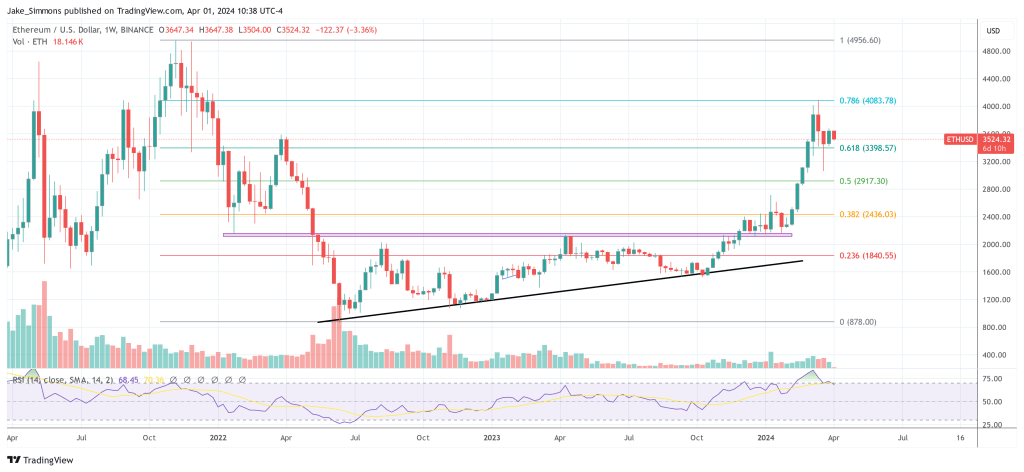ARTICLE AD BOX
In an in-depth exploration of Ethereum’s future, co-founder Vitalik Buterin has detailed an ambitious set of initiatives aimed at refining the protocol and easing the burden on node operators. Dubbed “The Purge,” this multifaceted plan targets the removal of obsolete functionalities and the introduction of several Ethereum Improvement Proposals (EIPs) to streamline the network’s operations and security.
Through a series of technical enhancements and optimizations, Buterin seeks not just simplification but a profound evolution of ETH in its operational dynamics.
The Broader Purge: A Sweeping Clean-Up
At the core of The Purge is EIP-6780, which emerged from the Dencun hard fork, dramatically diminishing the SELFDESTRUCT opcode’s capabilities. This opcode, which enables contracts to eliminate themselves from the blockchain, has been restricted to only operate if the contract was created in the same transaction.
“EIP-6780 is a pivotal example of our commitment to protocol simplification by stripping away complexity while enhancing security,” Buterin articulated in his blog post. The adjustments introduced by EIP-6780, while seemingly incremental, lay down essential invariants that simplify the construction and maintenance of ETH clients and infrastructure.
Buterin elaborates on these changes: “Post EIP-6780, a new invariant caps the number of storage slots editable in a single block, directly facilitating the eventual implementation of Verkle trees. Moreover, a contract will maintain its code throughout a transaction or block, bolstering security and efficiency across the board.”
Beyond the confines of EIP-6780, The Purge encompasses a broad spectrum of enhancements. Geth’s recent purge of thousands of lines of legacy code, the dismissal of “empty accounts,” and the establishment of an 18-day blob storage window post-Dencun represent pivotal strides towards a leaner, more agile Ethereum.
“These measures are not merely about reducing storage and computational overheads; they’re about ensuring Ethereum remains scalable, secure, and sustainable,” Buterin notes, highlighting the importance of these seemingly backend optimizations for the broader ecosystem.
Buterin points to the diminishing relevance and inherent complexities of precompiles within the Ethereum framework. “The utility of certain precompiles has not met our initial expectations, complicating new EVM implementations and presenting consensus challenges,” Buterin observes, suggesting a phased removal or replacement with EVM-compatible code to mitigate these issues without adversely impacting existing applications.
EIP-4444, LOG Reform And Transition To SSZOne of the most transformative proposals within The Purge is EIP-4444, which aims to redefine how Ethereum nodes manage historical data. By limiting the storage obligation to a manageable duration, Buterin proposes a paradigm shift in node operation, potentially democratizing node maintenance and fostering greater decentralization.
“Imagine a future where nodes, by not being burdened with the entirety of history, can operate more efficiently, contributing to a more decentralized network,” Buterin muses, emphasizing the strategic importance of EIP-4444 in Ethereum’s long-term vision.
Buterin also proposes a LOG reform to address the inefficiencies in how decentralized applications query historical event data. “Our current mechanism is too slow, pushing dApps towards centralized solutions. By simplifying the LOG opcode and leveraging ZK-SNARKs, we can create a more efficient and decentralized framework for accessing logs,” Buterin argues, showcasing a commitment to maintaining Ethereum’s decentralized ethos while improving its technical infrastructure.
The transition to SimpleSerialize (SSZ) represents another cornerstone of The Purge, promising a more streamlined and efficient serialization method. “SSZ not only simplifies the specification but also significantly reduces Merkle proof sizes, enhancing both efficiency and security,” Buterin explains, underscoring the critical nature of this transition for Ethereum’s future.
A Leaner, More Efficient EthereumThrough The Purge, Ethereum is not merely shedding excess weight but is undergoing a profound transformation. By addressing legacy issues, optimizing operational efficiencies, and laying down a roadmap for future enhancements, Ethereum is poised to enhance its scalability, security, and sustainability.
“These efforts are about more than simplification; they’re about ensuring Ethereum’s resilience and adaptability in the face of future challenges,” Buterin concludes, casting a vision of an Ethereum network that is leaner, more efficient, and ready for the demands of tomorrow.
At press time, ETH traded at $3,524.

.png)
 9 months ago
6
9 months ago
6








 English (US)
English (US)